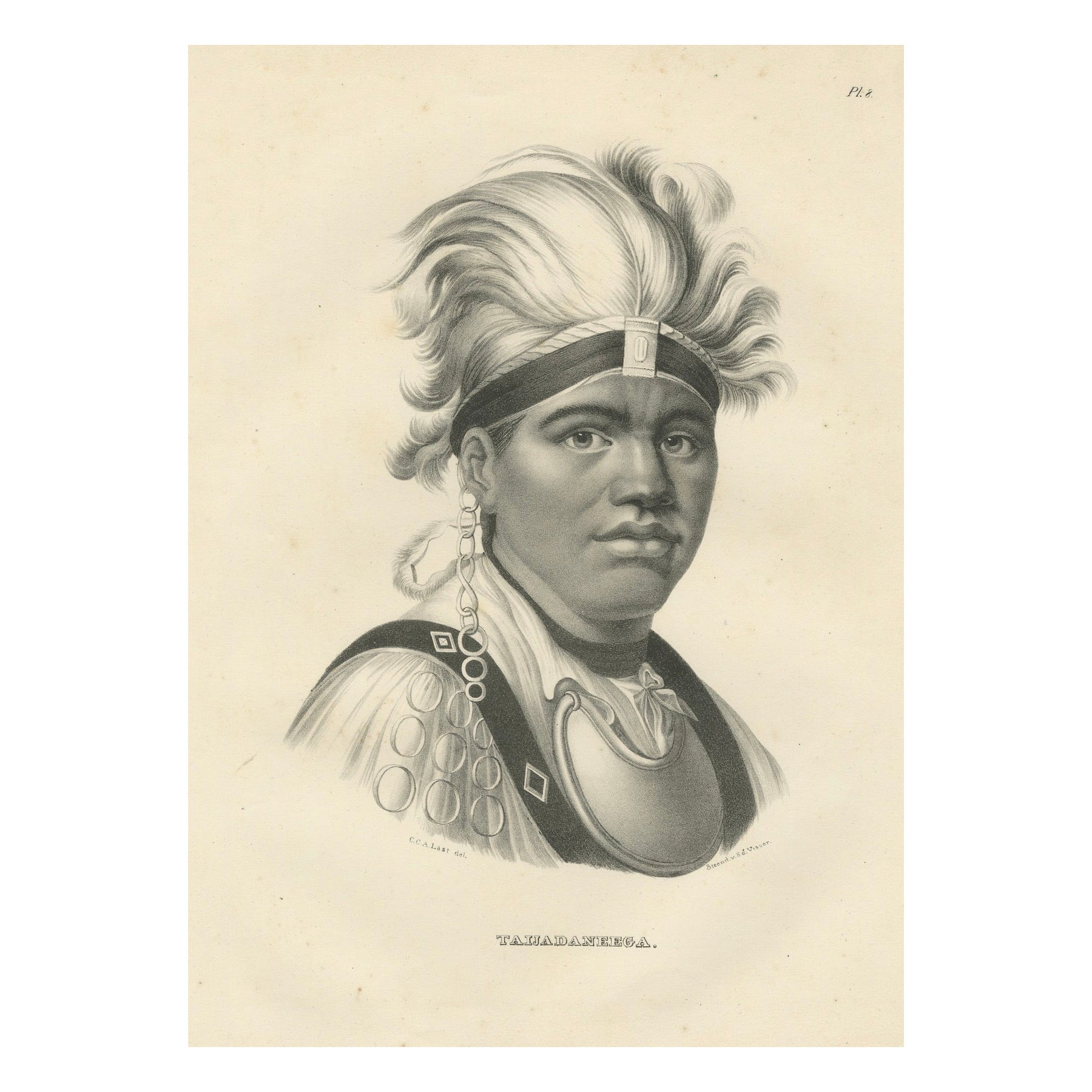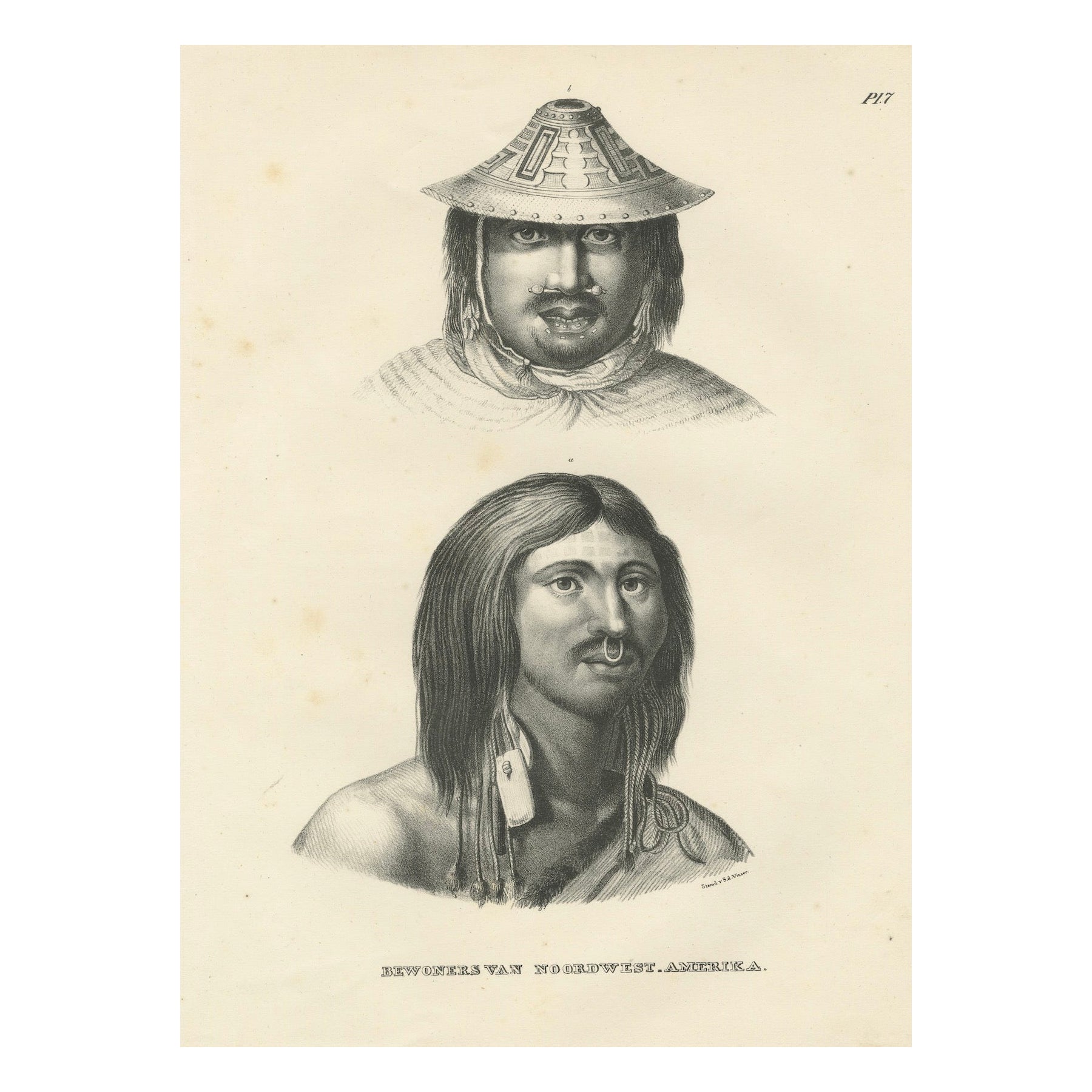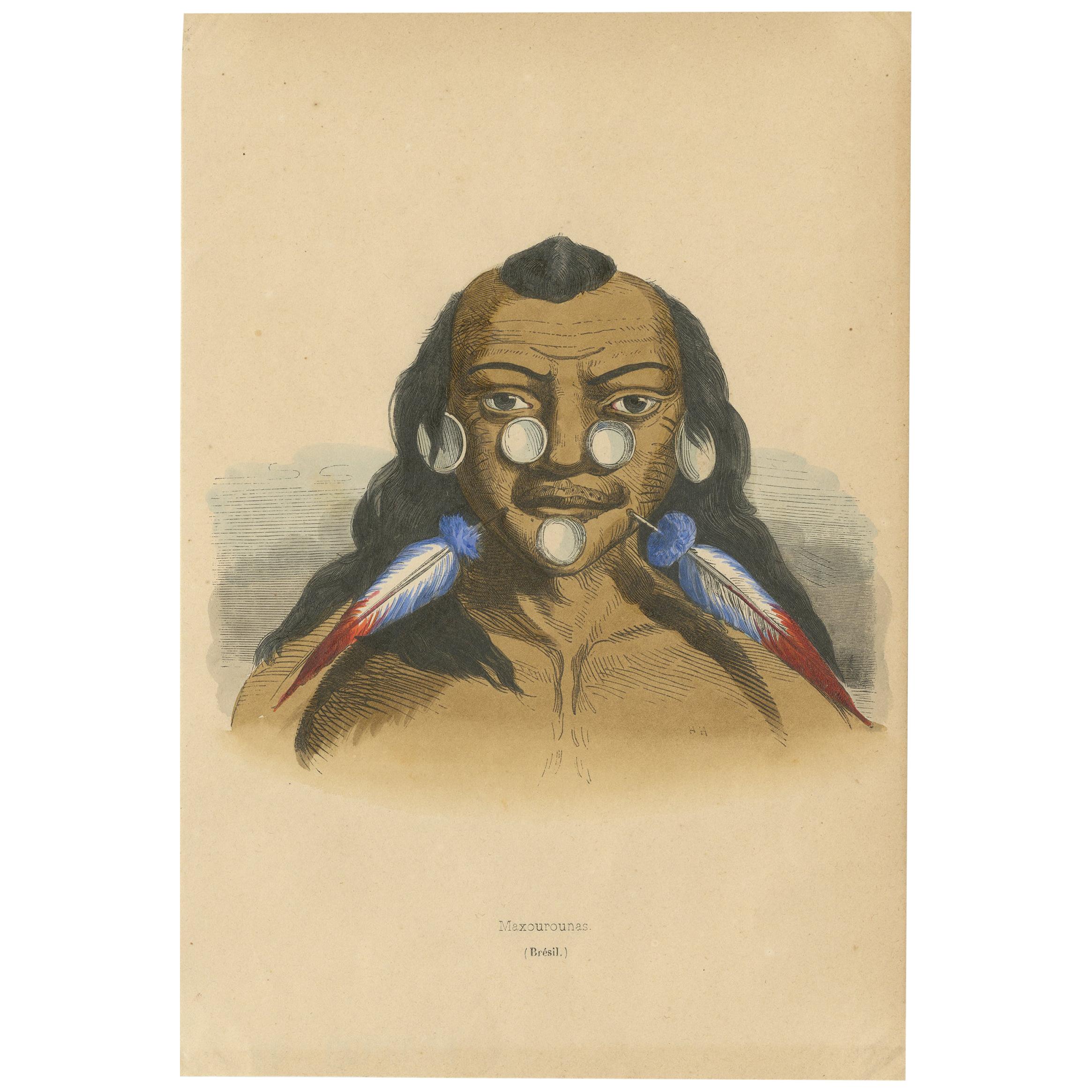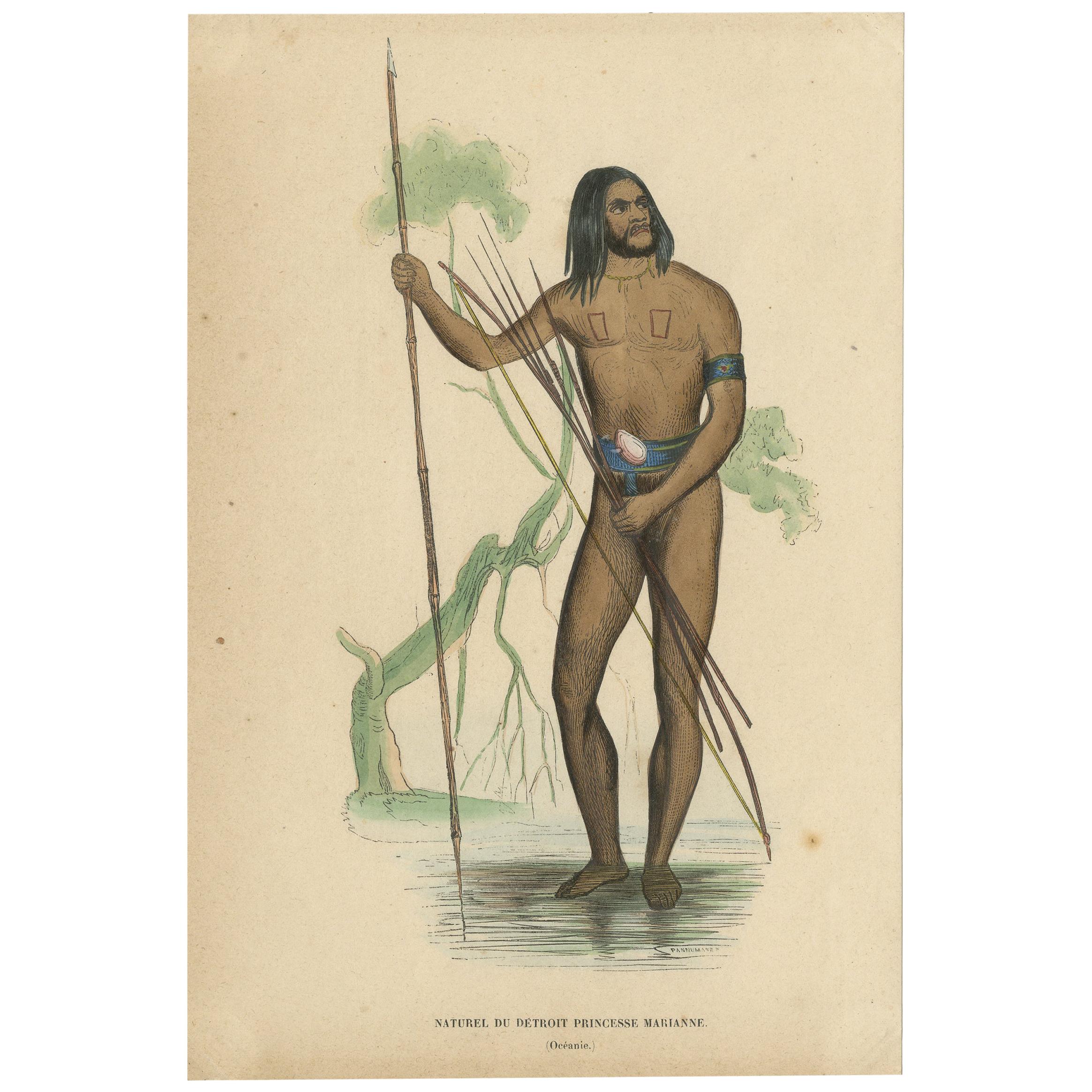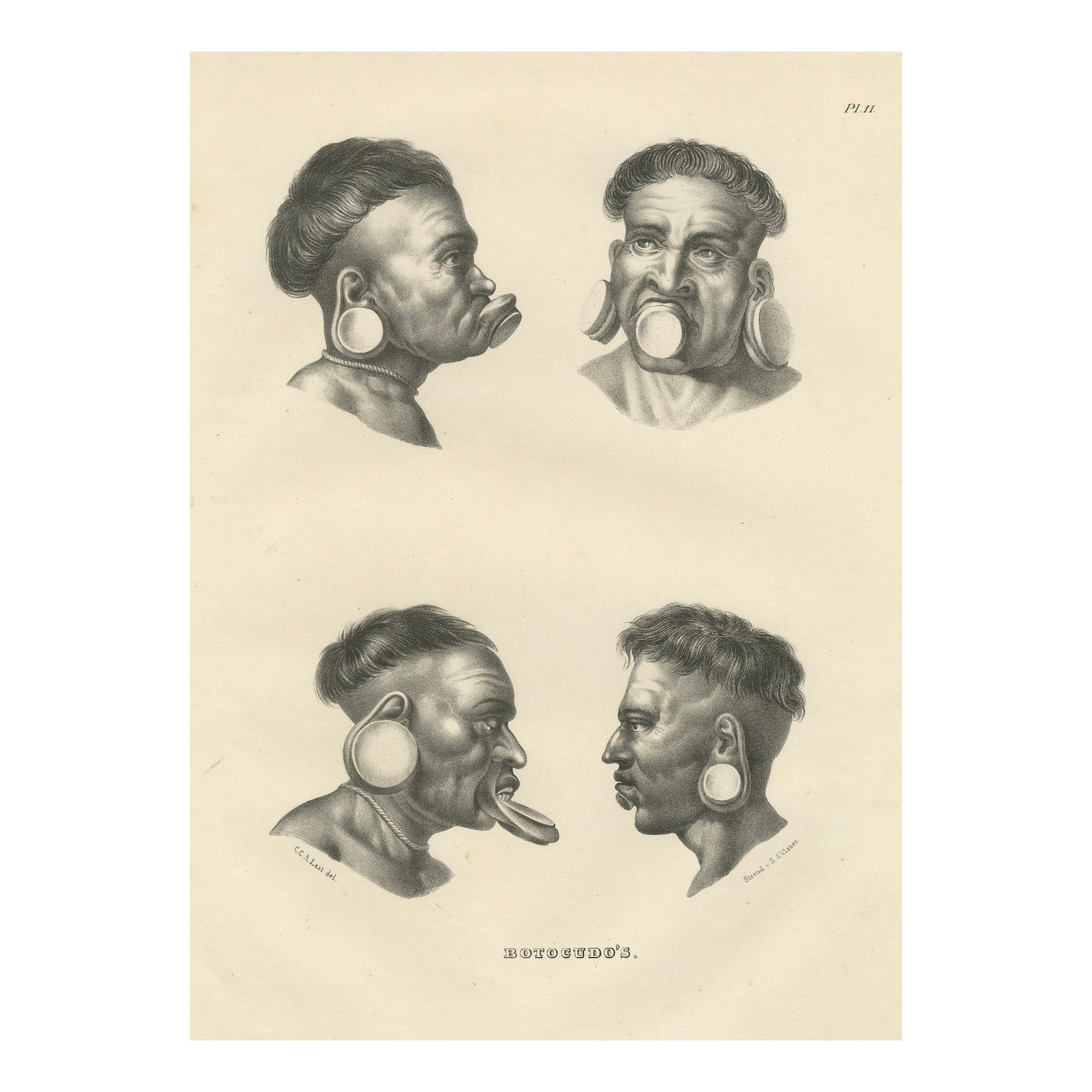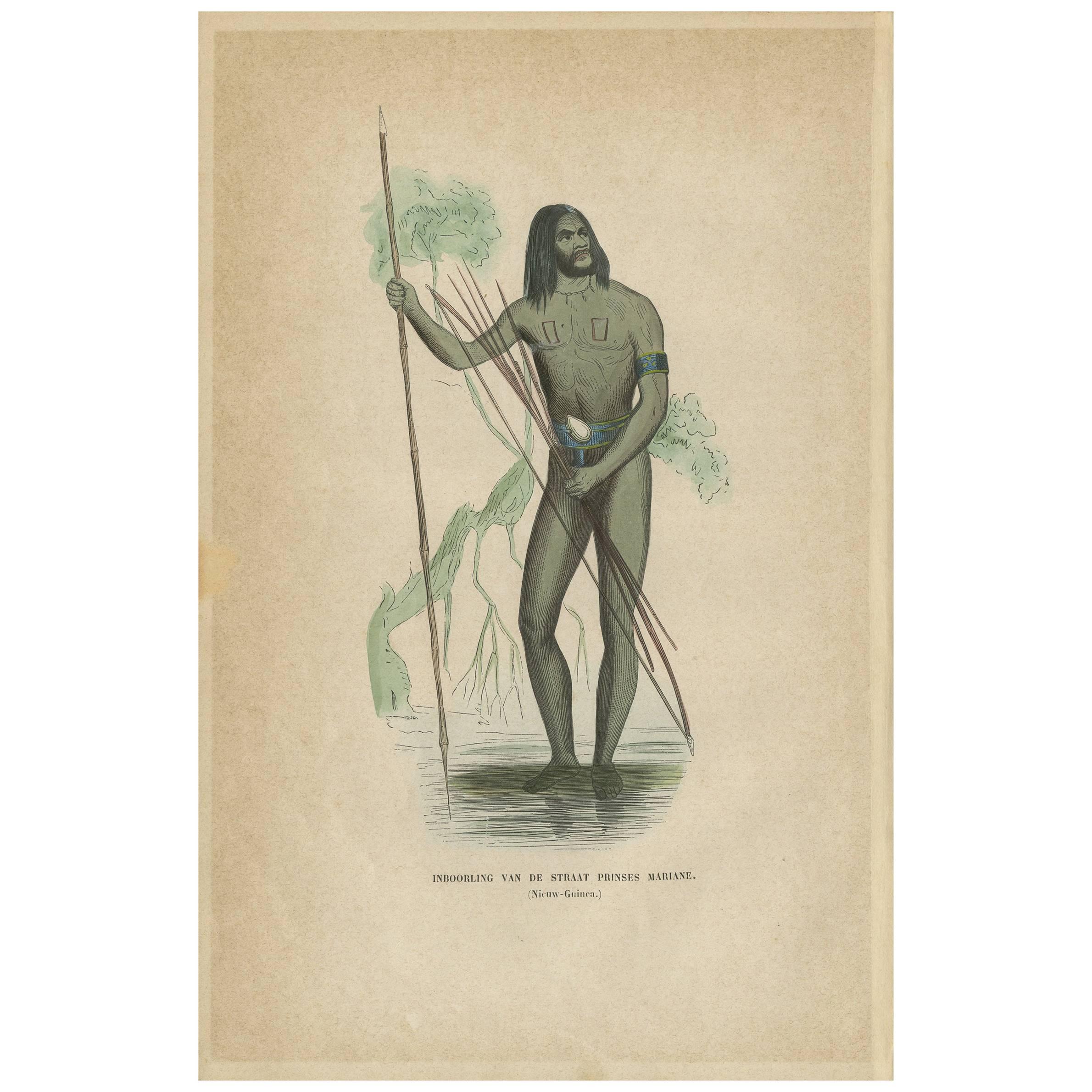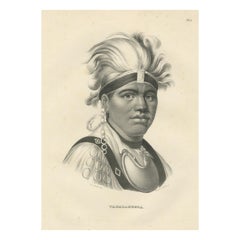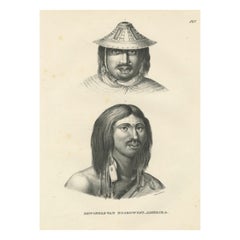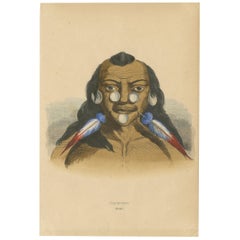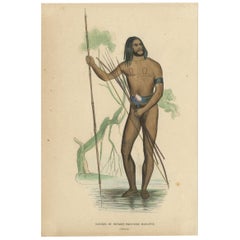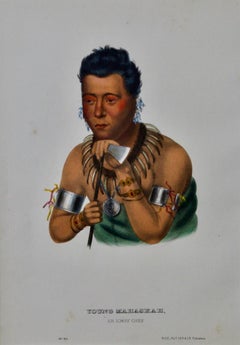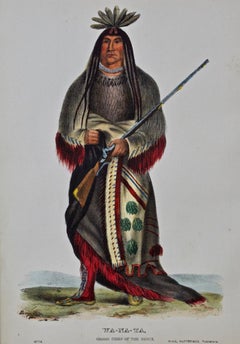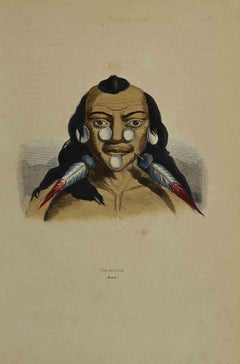Items Similar to Portrait of a Member of the Maxuruna Amazon Tribe by Karl Joseph Brodtmann, 1836
Want more images or videos?
Request additional images or videos from the seller
1 of 7
Portrait of a Member of the Maxuruna Amazon Tribe by Karl Joseph Brodtmann, 1836
$353.12
$524.9032% Off
£261.03
£388.0232% Off
€296
€44032% Off
CA$489.79
CA$728.0732% Off
A$533.98
A$793.7532% Off
CHF 282.14
CHF 419.4032% Off
MX$6,566.70
MX$9,761.3132% Off
NOK 3,508.24
NOK 5,214.9632% Off
SEK 3,302.55
SEK 4,909.1932% Off
DKK 2,253.89
DKK 3,350.3732% Off
About the Item
This lithograph, created by Karl Joseph Brodtmann, depicts an individual named Maxuruna, who appears to belong to an indigenous group, from South America, based on the adornments and distinctive features. The print showcases Brodtmann’s interest in indigenous peoples and their cultural markers, such as facial adornments and traditional ornamentation.
Description:
This lithograph portrays Maxuruna, a member of an indigenous tribe, identifiable by the unique facial piercings and decorations, possibly from the Amazon or another region in South America. The term Maxuruna may refer to an ethnic group from the Amazon Basin or a specific individual within an indigenous community.
- Facial adornments: Maxuruna is shown with elaborate piercings, including circular disks in both cheeks and around the mouth, which are distinctive cultural markers of certain indigenous tribes. These types of body modifications often held symbolic or social significance, reflecting status, identity, or religious practices within the tribe.
- Feather ornaments: The figure wears feathers attached to the piercings and a necklace with similar decorations, which may symbolize connection to nature, rank, or ceremonial roles within the community. Feathers were often used by many indigenous tribes to denote status or spiritual significance.
- Hairstyle: Maxuruna's hair is styled in a central tuft, leaving the sides shaved or short, a possible cultural hairstyle that identifies the individual’s tribal affiliation.
Maxuruna's expression is neutral but commanding, and Brodtmann’s detailed approach captures the texture of the skin, the positioning of the facial modifications, and the adornments, all rendered with precision.
Maker:
Karl Joseph Brodtmann (1787–1862), a Swiss lithographer, was known for his detailed work in both ethnographic and natural history subjects. His ethnographic prints offered European audiences insight into the diverse peoples encountered through exploration and colonization. His works were often part of larger collections documenting the variety of human cultures worldwide.
Technique and Style:
This piece, like many others by Brodtmann, was created using lithography, a printmaking technique that allows for great detail and subtle shading. Brodtmann’s style can be classified as ethnographic realism, focusing on the accurate representation of indigenous peoples and their distinct cultural attributes.
The lithograph makes use of detailed shading, particularly around the piercings, hair, and facial features, to create a three-dimensional effect. The meticulous attention to the size, placement, and texture of the adornments demonstrates Brodtmann’s commitment to depicting the unique cultural markers of the individuals he portrayed.
Cultural Context:
The name Maxuruna might be linked to a South American indigenous group, likely from the Amazon Basin, such as the Matsés, Yagua, or Mayoruna. The body modifications and feather adornments are distinctive cultural practices seen among indigenous groups from this region, often serving as symbols of rank, identity, or spiritual significance.
This print is part of a broader European fascination with the “exotic” and unfamiliar customs of indigenous peoples during the 19th century, reflecting both a curiosity about and a desire to document the world’s cultural diversity. Brodtmann’s portrayal of Maxuruna captures the intersection of artistic representation and anthropological documentation, contributing to the ethnographic knowledge of his time.
This lithograph would have been part of a collection intended to educate European audiences about the peoples of distant lands, reflecting the broader trends of scientific exploration and colonial interest in the 19th century.
- Dimensions:Height: 12.8 in (32.5 cm)Width: 10.24 in (26 cm)Depth: 0 in (0.02 mm)
- Materials and Techniques:
- Period:
- Date of Manufacture:1836
- Condition:Condition: good, given age. General age-related toning and/or occasional minor defects from handling. Some stains along the right border, not affecting the image. Please study scan carefully.
- Seller Location:Langweer, NL
- Reference Number:Seller: BG-13176-101stDibs: LU3054341515072
About the Seller
5.0
Recognized Seller
These prestigious sellers are industry leaders and represent the highest echelon for item quality and design.
Platinum Seller
Premium sellers with a 4.7+ rating and 24-hour response times
Established in 2009
1stDibs seller since 2017
2,620 sales on 1stDibs
Typical response time: <1 hour
- ShippingRetrieving quote...Shipping from: Langweer, Netherlands
- Return Policy
Authenticity Guarantee
In the unlikely event there’s an issue with an item’s authenticity, contact us within 1 year for a full refund. DetailsMoney-Back Guarantee
If your item is not as described, is damaged in transit, or does not arrive, contact us within 7 days for a full refund. Details24-Hour Cancellation
You have a 24-hour grace period in which to reconsider your purchase, with no questions asked.Vetted Professional Sellers
Our world-class sellers must adhere to strict standards for service and quality, maintaining the integrity of our listings.Price-Match Guarantee
If you find that a seller listed the same item for a lower price elsewhere, we’ll match it.Trusted Global Delivery
Our best-in-class carrier network provides specialized shipping options worldwide, including custom delivery.More From This Seller
View AllPortrait of Native American Tawadanega by Karl Joseph Brodtmann, 1836
Located in Langweer, NL
This lithograph, created by Karl Joseph Brodtmann, depicts Tawadanega, an individual whose name suggests Native American heritage, likely from one of the Eastern Woodlands tribes. Th...
Category
Antique 1830s Prints
Materials
Paper
$419 Sale Price
20% Off
Portraits of Inhabitants of Northwest America by Karl Joseph Brodtmann, 1836
Located in Langweer, NL
This lithograph, by Karl Joseph Brodtmann, is labeled "Bewoners van Noordwest-Amerika" (Inhabitants of Northwest America). It depicts two individuals from indigenous groups likely li...
Category
Antique 1830s Prints
Materials
Paper
$343 Sale Price
34% Off
Antique Costume Print of a Brazilian Warrior by Wahlen, 1843
Located in Langweer, NL
Antique costume print titled 'Maxourounas'. Original antique print of a Brazilian warrior. This print originates from 'Moeurs, usages et costumes de tous les peuples du monde' by Aug...
Category
Antique Mid-19th Century Prints
Materials
Paper
$95 Sale Price
20% Off
Antique Costume Print of a Native of Marianna Island by Wahlen, 1843
Located in Langweer, NL
Antique costume print titled 'Naturel du Detroit Princess Marianne'. Original antique print of a native of Marianna Island. This print originates from 'Moeurs, usages et costumes de ...
Category
Antique Mid-19th Century Prints
Materials
Paper
$95 Sale Price
20% Off
Portraits of Botocudo People from South America by Karl Joseph Brodtmann, 1836
Located in Langweer, NL
This lithograph by Karl Joseph Brodtmann depicts members of the Botocudo people, an indigenous group from Brazil. The Botocudo are historically known for their distinctive use of lar...
Category
Antique 1830s Prints
Materials
Paper
$419 Sale Price
20% Off
Antique Print of a Native from the Princess Marianne Strait by H. Berghaus, 1855
Located in Langweer, NL
Antique print titled 'Inboorling van de straat Prinses Mariane, Nieuw-Guinea (Papua New Guinea)'. This print originates from the second volume of ‘De Volken van den Aardbodem (..)’ b...
Category
Antique Mid-19th Century Prints
Materials
Paper
$95 Sale Price
20% Off
You May Also Like
Young Mahaskah, An Ioway Chief: Original Hand-colored McKenney & Hall Lithograph
By McKenney & Hall
Located in Alamo, CA
This an original 19th century hand colored McKenney and Hall engraving of a Native American entitled "Young Mahaskah, An Ioway Chief, No. 80", published by Rice, Rutter & Co. in 1865...
Category
Mid-19th Century Naturalistic Portrait Prints
Materials
Lithograph
Wa-Na-Ta, Chief of the Sioux: Original Hand-colored McKenney & Hall Lithograph
By McKenney & Hall
Located in Alamo, CA
This is an original 19th century hand-colored McKenney and Hall lithographic portrait of a Native American entitled "Wa-Na-Ta, Grand Chief of the Sio...
Category
Mid-19th Century Naturalistic Portrait Prints
Materials
Lithograph
Maxourounas - Lithograph by Auguste Wahlen - 1844
Located in Roma, IT
Maxourounas is a hand colored lithographs realized by Auguste Wahlen in 1844.
Good conditions.
The artwork belongs to the Suite Moeurs, usages et cost...
Category
1840s Modern Figurative Prints
Materials
Lithograph
Wa-Kawn, A Winnebago Chief: Folio-sized Hand-colored McKenney & Hall Lithograph
By McKenney & Hall
Located in Alamo, CA
This is an original 19th century hand-colored folio-size McKenney and Hall lithograph of a Native American entitled "Wa-Kawn, A Winnebago Chief", after a painting by Charles Bird Kin...
Category
Mid-19th Century Naturalistic Portrait Prints
Materials
Engraving
Sewessissing Chief of the Eowah Indians, Native American portrait engraving
Located in Melbourne, Victoria
Copper-line engraving with original hand-colouring by M Griffith after Charles Hamilton Smith, 1827.
Depicts the Sewessissing, chief of the Iowa Indians.
Charles Hamilton Smith (1...
Category
Early 19th Century American Impressionist Portrait Prints
Materials
Engraving
Shau-Hau-Napo-Tinia, Ioway Chief: A 19th C. Hand-colored McKenney & Hall Litho
By McKenney & Hall
Located in Alamo, CA
This is an original 19th century hand-colored McKenney and Hall lithograph of a Native American entitled "Shau-Hau-Napo-Tinia, An Ioway Chief", lithographed by J. T. Bowen after a pa...
Category
Mid-19th Century Naturalistic Portrait Prints
Materials
Lithograph
More Ways To Browse
Used Bridal Veil
Used Tennis Balls
Venetian Bombe
Vintage Apple Blossom
Vintage Asian Art Panels
Vintage Black Ceramic Cats
Vintage Blanket Basket
Vintage Brass Tiger
Vintage Brown Snuff Bottles
Vintage Ceramic Leopard
Vintage Ceramic Rabbits
Vintage Decoupage Paper
Vintage Electric Iron
Vintage Horn Table
Vintage Ibis
Vintage Marble Top Garden Table
Vintage Room Thermometer
Vintage Rooster Plate
